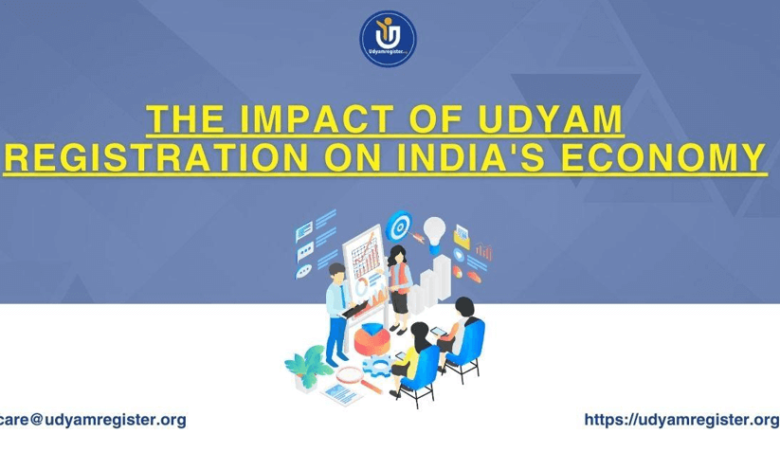The Impact of Udyam Registration on India’s Economy

Introduction
The introduction of Udyam Registration marks a significant milestone in the Indian government’s efforts to promote and support the Micro, Small, and Medium Enterprises (MSME) sector. Launched on July 1, 2020, Udyam Registration replaces the earlier process of registering MSMEs under the Micro, Small, and Medium Enterprises Development Act, 2006. This new system aims to simplify the registration process, provide numerous benefits to registered enterprises, and ultimately boost the Indian economy. This article explores the various ways in which Udyam Registration has impacted India’s economic landscape.
Simplification and Accessibility
One of the most significant impacts of Udyam Registration is the simplification of the registration process. The previous system was often criticized for being cumbersome and bureaucratic, discouraging many small business owners from registering their enterprises. Udyam Registration has streamlined this process, making it entirely online, paperless, and based on self-declaration. This ease of access encourages more entrepreneurs to register their businesses, bringing them into the formal economy and making them eligible for a range of government benefits.
Increased Formalization of the MSME Sector
The formalization of the MSME sector is crucial for the Indian economy. By registering under Udyam, businesses can avail themselves of various government schemes, subsidies, and incentives designed to support and promote small enterprises. This increased formalization helps in better policy formulation and implementation, as the government can accurately track and address the needs of the MSME sector. Moreover, formalization ensures better compliance with tax regulations, contributing to increased government revenue.
Enhanced Access to Finance
Access to finance has traditionally been a significant challenge for MSMEs in India. Udyam Registration addresses this issue by providing registered businesses with a unique Udyam Registration Number (URN), which serves as a vital tool for accessing credit and loans from financial institutions. Banks and other financial entities often require proof of registration for extending credit, and the streamlined Udyam process facilitates this. Additionally, registered MSMEs are eligible for priority sector lending, lower interest rates, and various government-backed credit schemes, improving their financial health and growth prospects.
Promotion of Innovation and Competitiveness
Udyam Registration plays a crucial role in promoting innovation and competitiveness among MSMEs. Registered businesses can access various government programs aimed at fostering innovation, technology adoption, and skill development. These initiatives help MSMEs improve their productivity, reduce costs, and enhance their competitiveness in both domestic and global markets. By encouraging a culture of innovation, Udyam Registration contributes to the overall growth and modernization of the Indian economy.
Employment Generation
The MSME sector is a significant source of employment in India, providing jobs to millions of people. By simplifying the registration process and offering various incentives, Udyam Registration encourages the establishment and growth of new enterprises. This, in turn, leads to the creation of more job opportunities, particularly in rural and semi-urban areas. The resulting employment generation helps in alleviating poverty, reducing regional disparities, and promoting inclusive economic growth.
Boost to Exports
Many MSMEs in India are engaged in export-oriented activities, contributing significantly to the country’s export earnings. Udyam Registration helps these enterprises by providing them with the necessary support to enhance their export capabilities. Registered MSMEs can access various export promotion schemes, participate in international trade fairs, and receive guidance on market access and export procedures. This support boosts their competitiveness in global markets, increasing India’s export revenues and improving the trade balance.
Strengthening Supply Chains
Udyam Registration also plays a pivotal role in strengthening the supply chains within the Indian economy. By bringing more MSMEs into the formal fold, the visibility and reliability of these enterprises improve, making them more attractive partners for larger companies. This formalization ensures that supply chains become more robust and resilient, as registered MSMEs are better equipped to meet quality standards and regulatory requirements. Consequently, the overall efficiency and effectiveness of supply chains in India are enhanced, which is critical for economic stability and growth.
Encouraging Digital Transformation
Digital transformation is essential for the modernization and competitiveness of MSMEs. Udyam Registration supports this transition by encouraging businesses to adopt digital tools and technologies. The online nature of the registration process itself introduces MSMEs to digital platforms, fostering a culture of technological adoption. Furthermore, registered MSMEs are more likely to participate in government programs that provide access to digital resources, training, and infrastructure, helping them to streamline their operations, improve customer reach, and optimize their business processes.
Fostering Inclusive Growth
Inclusive growth is a key objective for the Indian economy, and Udyam Registration contributes significantly to this goal. By simplifying the registration process and providing equal opportunities for all entrepreneurs, including those from marginalized communities and remote areas, the initiative ensures that the benefits of economic development are widely shared. This inclusivity helps in reducing socio-economic disparities and promotes more balanced and equitable growth across different regions of the country.
Read also: The Impact of GeM Registration on Business Growth and Development
Environmental Sustainability
As the world grapples with environmental challenges, sustainable business practices have become imperative. Udyam Registration can indirectly contribute to environmental sustainability by enabling MSMEs to access government schemes that promote green technologies and sustainable practices. Registered enterprises are better positioned to receive financial incentives for adopting energy-efficient technologies, waste management systems, and renewable energy sources. These initiatives not only reduce the environmental footprint of MSMEs but also pave the way for a more sustainable industrial ecosystem in India.
Challenges and the Way Forward
Despite the positive impacts, some challenges need to be addressed to fully realize the potential of Udyam Registration. One of the primary challenges is raising awareness about the benefits of registration among MSME owners, particularly in rural and underserved regions. The government and related agencies must intensify their outreach and education efforts to ensure that more businesses come forward to register.
Note: Now update udyam certificate through udyam portal.
Conclusion
Udyam Registration has emerged as a game-changer for the MSME sector in India. By simplifying the registration process, increasing formalization, enhancing access to finance, promoting innovation, generating employment, and boosting exports, Udyam Registration has made a profound impact on the Indian economy. As more businesses continue to register and benefit from this system, the MSME sector is poised to become a driving force in India’s economic growth and development. The government’s continued focus on supporting MSMEs through initiatives like Udyam Registration will be crucial in achieving the vision of a self-reliant and prosperous India.





